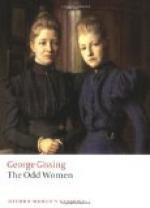’Making a bad case very much worse, instead of bravely bettering it.’
’Yes, but human nature is human nature. I am only urging to you the case of average intelligent men. As likely as not—so preposterous are our conventions—you have never heard it put honestly. I tell you the simple truth when I say that more than half these men regard their wives with active disgust. They will do anything to be relieved of the sight of them for as many hours as possible at a time. If circumstances allowed, wives would be abandoned very often indeed.’
Rhoda laughed.
‘You regret that it isn’t done?’
’I prefer to say that I approve it when it is done without disregard of common humanity. There’s my friend Orchard. With him it was suicide or freedom from his hateful wife. Most happily, he was able to make provision for her and the children, and had strength to break his bonds. If he had left them to starve, I should have understood it, but couldn’t have approved it. There are men who might follow his example, but prefer to put up with a life of torture. Well, they do prefer it, you see. I may think that they are foolishly weak, but I can only recognize that they make a choice between two forms of suffering. They have tender consciences; the thought of desertion is too painful to them. And in a great number of cases, mere considerations of money and the like keep a man bound. But conscience and habit—detestable habit—and fear of public opinion generally hold him.’
‘All this is very interesting,’ said Rhoda, with grave irony. ’By-the-bye, under the head of detestable habit you would put love of children?’
Barfoot hesitated.
’That’s a motive I oughtn’t to have left out. Yet I believe, for most men, it is represented by conscience. The love of children would not generally, in itself, be strong enough to outweigh matrimonial wretchedness. Many an intelligent and kind-hearted man has been driven from his wife notwithstanding thought for his children. He provides for them as well as he can—but, and even for their sakes, he must save himself.’
The expression of Rhoda’s countenance suddenly changed. An extreme mobility of facial muscles was one of the things in her that held Everard’s attention.
‘There’s something in your way of putting it that I don’t like,’ she said, with much frankness; ’but of course I agree with you in the facts. I am convinced that most marriages are hateful, from every point of view. But there will be no improvement until women have revolted against marriage, from a reasonable conviction of its hatefulness.’
‘I wish you all success—most sincerely I do.’
He paused, looked about the room, and stroked his ear. Then, in a grave tone,—
’My own ideal of marriage involves perfect freedom on both sides. Of course it could only be realized where conditions are favourable; poverty and other wretched things force us so often to sin against our best beliefs. But there are plenty of people who might marry on these ideal terms. Perfect freedom, sanctioned by the sense of intelligent society, would abolish most of the evils we have in mind. But women must first be civilized; you are quite right in that.’




